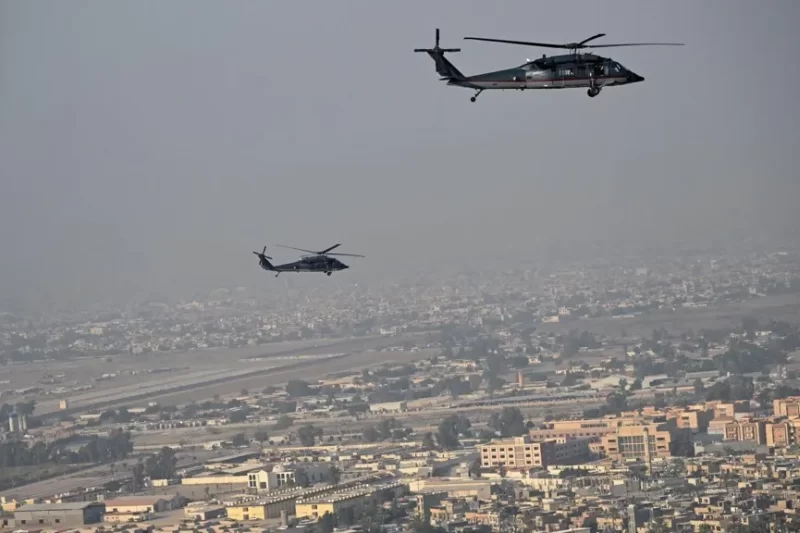US to Partially Evacuate Embassy in Iraq as Iran Tensions Rise
Non-essential US embassy staff and their dependants in Baghdad are to be evacuated from Iraq due to heightened security risks, US government sources have said.
Officials did not say exactly what prompted the removal, but have been told Israel was ready to launch an operation into Iran, the BBC's US partner CBS reported.
This was part of the reason some Americans were advised to leave the region, officials said, adding that they anticipated Iran could retaliate on certain US sites in Iraq.
It comes as US talks over Iran's nuclear programme appear to have stalled in recent days.
US Middle East envoy Steve Witkoff is still planning on holding talks with Iran about its nuclear program on Sunday, officials told CBS.
Witkoff will meet Iranian Foreign Minister Abbas Araghchi in Muscat, Axios reported.
A US state department official told the BBC: "We are constantly assessing the appropriate personnel posture at all our embassies.
"Based on our latest analysis, we decided to reduce the footprint of our mission in Iraq."
Speaking at the Kennedy Center, US President Donald Trump told reporters Americans were advised to leave the region "because it could be a dangerous place, and we'll see what happens".
Trump also reiterated that the US did not want Iran to develop a nuclear weapon. "We're not going to allow that," he said.
The president has hoped to strike a deal to stop Tehran developing a nuclear weapon.
Earlier this week, he held a 40-minute phone call, which was said to be "tense", with Israel's Prime Minister Benjamin Netanyahu, who has long argued for a military rather than diplomatic approach.
US to partially evacuate embassy in Iraq as Iran tensions rise
2 hours ago
Tom Bateman
BBC State Department Correspondent
Mike Wendling
BBC News
Share
Save

0:22
Watch: Trump says US personnel "being moved out" of the Middle East
Non-essential US embassy staff and their dependants in Baghdad are to be evacuated from Iraq due to heightened security risks, US government sources have said.
Officials did not say exactly what prompted the removal, but have been told Israel was ready to launch an operation into Iran, the BBC's US partner CBS reported.
This was part of the reason some Americans were advised to leave the region, officials said, adding that they anticipated Iran could retaliate on certain US sites in Iraq.
It comes as US talks over Iran's nuclear programme appear to have stalled in recent days.
Advertisement
US Middle East envoy Steve Witkoff is still planning on holding talks with Iran about its nuclear program on Sunday, officials told CBS.
Witkoff will meet Iranian Foreign Minister Abbas Araghchi in Muscat, Axios reported.
A US state department official told the BBC: "We are constantly assessing the appropriate personnel posture at all our embassies.
"Based on our latest analysis, we decided to reduce the footprint of our mission in Iraq."
Speaking at the Kennedy Center, US President Donald Trump told reporters Americans were advised to leave the region "because it could be a dangerous place, and we'll see what happens".
Trump also reiterated that the US did not want Iran to develop a nuclear weapon. "We're not going to allow that," he said.
The president has hoped to strike a deal to stop Tehran developing a nuclear weapon.
Earlier this week, he held a 40-minute phone call, which was said to be "tense", with Israel's Prime Minister Benjamin Netanyahu, who has long argued for a military rather than diplomatic approach.
With the nuclear talks at a critical moment, it is not yet clear how much the US announcement is about signalling as opposed to genuine concern.
But Iranian Defence Minister Aziz Nasirzadeh said his country would retaliate against US bases in the region if talks failed and Trump ordered military strikes against the Islamic Republic.
US Defence Secretary Pete Hegseth also approved the voluntary departure of families of American military personnel from countries across the Middle East, including Kuwait and Bahrain, Reuters news agency reported.
Testifying in front of a congressional panel on Wednesday, the Pentagon said he believed there were "plenty of indications" that Iran was "moving their way towards something that would look a lot like a nuclear weapon".
Iran says its uranium enrichment programme was for civilian energy generation and that it was not trying to build an atomic bomb.
The UK's Maritime Trade Operations organisation - part of the Royal Navy - warned on Wednesday that increased military tensions in the Middle East could affect shipping.
The price of oil initially increased more than 4% when news of the US evacuation broke, in anticipation of regional insecurity potentially leading to supply problems.
Around 2,500 US troops are based in Iraq, according to the defence department.
(Source:BBC)













